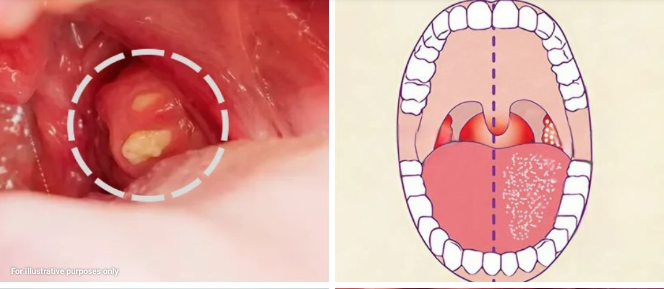Have you ever spotted small, pale yellowish lumps at the back of your throat or struggled with persistent bad breath despite thorough brushing? These could be tonsil stones, also referred to as tonsilloliths. Though they might appear worrisome, these small formations are typically benign. However, they can cause discomfort, and understanding their formation, recognizing their symptoms, and learning how to address them can significantly improve your comfort.
What Are Tonsil Stones?
Tonsil stones are tiny, hardened deposits that form within the crevices of your tonsils. The tonsils, with their natural grooves and pockets, can collect food particles, dead cells, mucus, and bacteria. Over time, these substances may solidify into small stones.
Tonsil stones are most prevalent among children and young adults, though they can occur at any age. While not typically a serious medical concern, they are often responsible for ongoing bad breath and throat discomfort.
Common Symptoms
Small tonsil stones may go unnoticed, but larger ones can lead to a variety of bothersome symptoms, including:
Bad breath (halitosis): Sulfur-producing bacteria in the stones can create an unpleasant odor.
Sore throat or trouble swallowing: The presence of stones may cause throat irritation.
Metallic taste in the mouth: A noticeable, unusual taste can occur.
Swollen tonsils or visible white patches: You may see white spots at the back of your throat.
Ear discomfort or pressure: This can happen even without an ear infection.
Persistent coughing or throat irritation: Ongoing irritation may prompt frequent coughing.
Recurring tonsil infections or tonsillitis: Stones can contribute to repeated infections.
If these symptoms persist, scheduling a visit with a healthcare provider for a thorough evaluation is a wise step.
Diagnosing Tonsil Stones
Identifying tonsil stones is generally simple. A healthcare provider can often confirm their presence with a physical examination of the throat. In some instances, imaging tests like an X-ray or CT scan may be suggested to rule out other conditions. If infection is suspected, a throat culture might also be performed.
Treatment Options
Fortunately, tonsil stones often resolve without intervention. Many remain small or dislodge naturally without causing issues. For those that cause discomfort, several treatment approaches are available:
Self-Removal
Some individuals carefully remove tonsil stones at home using a cotton swab, gargling with saltwater, or coughing gently. Caution is key—avoid sharp objects to prevent injury to the tonsils.
Medicated Gargles
Antibacterial mouthwashes or prescribed gargles can reduce bacteria, freshen breath, and help prevent stone formation.
Oral Irrigators
These devices use water to clear out tonsil crypts, removing trapped debris and reducing buildup.
Surgical Removal
In cases of frequent or severe tonsil stones, a tonsillectomy—surgical removal of the tonsils—may be advised. This is typically reserved for situations involving repeated infections or significant discomfort.
Home Remedies for Relief
For mild tonsil stones, several at-home remedies can offer relief:
Saltwater gargles: Dissolve a teaspoon of salt in warm water and gargle to soothe inflammation and loosen stones.
Apple cider vinegar rinse: Diluted with water, this can help balance pH levels and discourage bacterial growth.
Stay hydrated: Drinking plenty of water prevents dry mouth, which can contribute to stone formation.
Maintain good oral hygiene: Brush your teeth and tongue, and floss regularly to control bacteria.
While these remedies may not fully eliminate tonsil stones, they can reduce discomfort and lower the likelihood of recurrence.
Preventing Tonsil Stones
Completely preventing tonsil stones may not always be possible, but adopting certain habits can reduce their occurrence:
Maintain excellent oral hygiene: Brush twice daily, floss, and use an antibacterial mouthwash.
Stay hydrated: Drinking water regularly helps flush away food particles and bacteria.
Avoid smoking and excessive alcohol: These can irritate the throat and encourage bacterial growth.
Visit your dentist regularly: Routine dental check-ups can help detect early signs of tonsil stone buildup.
Final Thoughts
Tonsil stones can be bothersome, but they are generally harmless. Prioritizing good oral hygiene and staying attentive to symptoms can make a significant difference. If you experience ongoing bad breath, throat discomfort, or frequent infections, consulting a healthcare professional is recommended. They can confirm whether tonsil stones are the cause and suggest an appropriate treatment plan.
With consistent care and preventive measures, you can effectively manage tonsil stones and maintain a fresh, healthy mouth.




